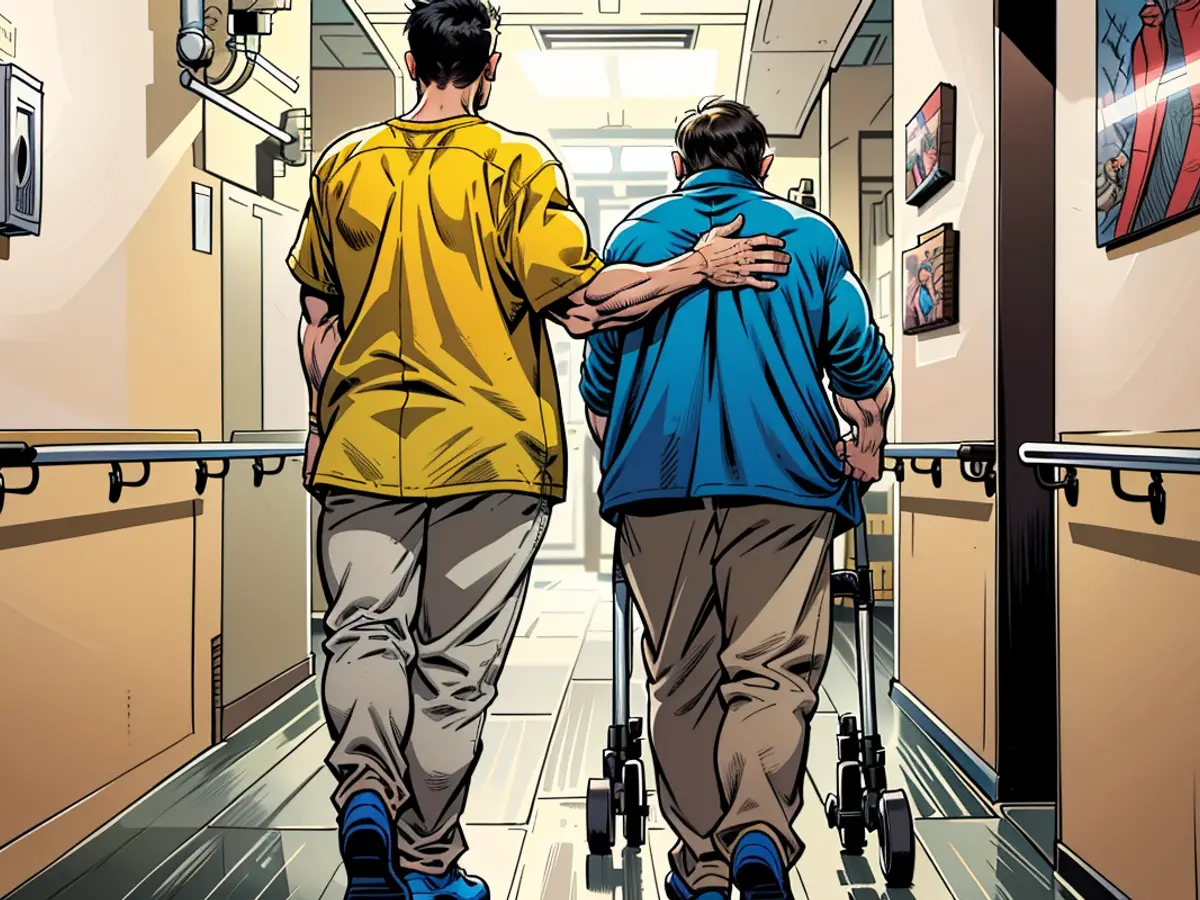Care in need - Experts urge reforms in the care sector at turbo speed
Nursing homes and home care services must reject applicants, hospital social services cannot provide follow-up care, and the existing personnel are working at their limits: Representatives from the Care Society, the State Nursing Chamber, the Social Association VdK, and from practice paint a grim picture of the situation in Rhineland-Palatinate. They urgently demand reforms from the state government and the nursing insurance funds. "We need emergency surgery before rehabilitation," said the chairman of the Care Society Gerhard Lenzen in Mainz.
"The crisis only affects us, but not the nursing insurance funds and the state," added Lenzen's colleague Jutta Schier and demanded that a common effort be made. A joint position paper, which has been in existence for about a year and contains solution proposals from the industry, has not yet led to concrete improvements, criticized Lenzen. It's not enough to talk about models and projects anymore, it's necessary to act boldly and work together to find solutions, said Sebastian Rutten from the Care Society.
The offer is becoming scarcer
"The waiting lists are getting longer and longer," said Lenzen. Desperate beneficiaries turned to care facilities and had to find out that they could not be helped, reported Regina Bernhart from the Caritas Association Speyer.
There is a shortage of specialists and the existing carers and caregivers are so overloaded that they are on average 32 days a year unable to work, said Lenzen. The financing of the institutions is at 95% occupancy, but this is decreasing because of the lack of personnel. Insolvencies and tasks are the result: "The already scarce offer is further reduced."
"Nursing is in a serious crisis," Lenzen concluded. The demographic development will aggravate the "critical situation," the nursing staff shortage, and the need for care, he added.
Call for bureaucracy reduction
The President of the Nursing Chamber, Markus Mai, called for a drastic reduction in bureaucracy for nursing staff. "We are experiencing a significant culture of mistrust." Nursing services should be able to digitally enter data first, then print it out and submit it to the nursing insurance funds before receiving their money, criticized he.
More appreciation for the professionals and harsher penalties for fraudsters in the industry are also needed, Mai added. He also sees the Federal Government responsible for quick improvements. If nothing sustainable improves at the federal level, the states and the municipalities have no room for maneuver.
Waiting times are getting longer
Moritz Ehl from the Social Association VdK pointed out that 17 out of 20 care-dependent people in Rhineland-Palatinate were cared for at home. This was often a significant burden for the family. And it led to further problems, such as fewer employable women, therefore fewer specialists in other professions, and pensioner poverty among carers. Family carers often found no help or were in financial need. At the same time, the self-payment for home care was rising increasingly, to 3000 to 3500 Euros per month, added Lenzen.
The waiting times for rehabilitation - approximately after a stroke - are getting longer, said Klaudia Klaus-Höhl from the Bruderkrankenhaus in Trier. And now some places are no longer being staffed due to personnel shortages. Social welfare offices often needed half a year to clarify financing for those in need. She urged for the structures for well-trained personnel from abroad to be simplified urgently to catch the personnel shortage to some extent.
Bernhart from the Caritasverband reported on long waiting times for logopedists, physiotherapists, and ergotherapists. Old people also could not find a new family doctor when moving. Not only in rural areas, but also in cities like Ludwigshafen, the offer of meals on wheels was much too thin.
The employees in the care facilities were always a valve for the desperation, grief, and anger of care-dependent individuals and their relatives, reported Bernhart. Verbal attacks and at times even dangerous situations were the result.
- The Care Society Chairman Gerhard Lenzen in Mainz emphasized the need for long-term care insurance funds to provide immediate solutions, as they are not directly affected by the crisis.
- Jutta Schier, Lenzen's colleague, pointed out that the waiting lists for care facilities are growing longer due to the shortage of specialists and overworked caregivers.
- Sebastian Rutten from the Care Society suggested an urgent collaboration between the state government, nursing insurance funds, and industry specialists to find effective solutions.
- Moritz Ehl from the Social Association VdK shared that the increasing self-payment for home care services is placing a significant financial burden on families, leading to pensioner poverty among caregivers.
- Klaudia Klaus-Höhl from the Bruderkrankenhaus in Trier highlighted the growing wait times for rehabilitation services, citing the challenges in securing funding and attracting well-trained personnel from abroad.








